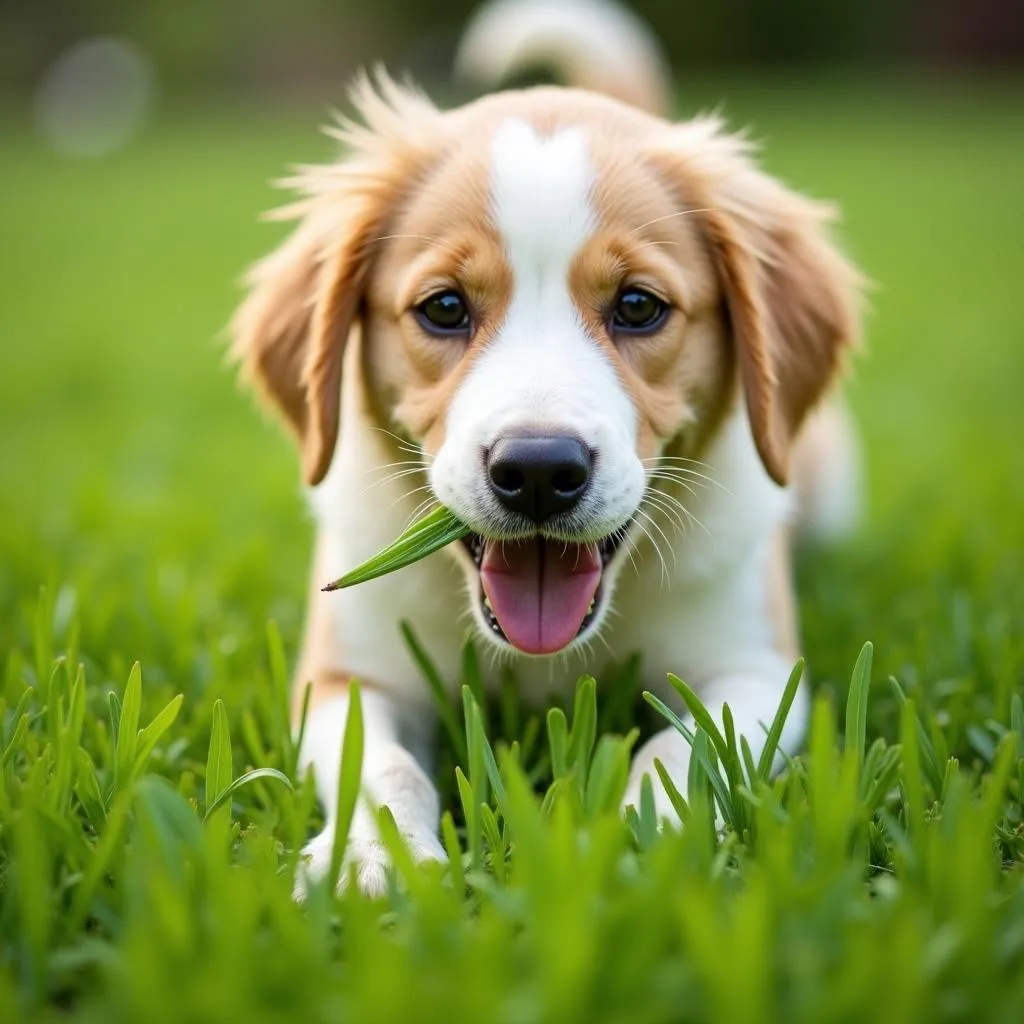“Con chó nhà ta mà ăn cỏ thì có sao không?”. This is a common question that many pet owners ask. Grass is a natural part of our environment, but for dogs, it can be a bit of a mystery. You might have seen your dog munching on blades of grass, and wondered if this is a normal behavior or something to be worried about. Let’s dive into the fascinating world of “grass dog” and understand why our furry friends might be tempted to eat the green stuff.
The Mystery of the Grass Eater
Dogs are naturally curious creatures, and they often explore their surroundings through their mouths. This is especially true for puppies, who are constantly putting things in their mouths to learn about their environment. And while grass is a perfectly safe and even beneficial part of their diet for most herbivores, what about our carnivorous canines?
Why do dogs eat grass?
There are a few theories as to why dogs eat grass:
- Nutritional Deficiencies: Dr. Nguyen Van Anh, a renowned veterinarian in Hanoi, states that dogs might be seeking extra nutrients from grass. Some theories suggest dogs may be lacking certain vitamins or minerals in their diet, which they can obtain from grass.
- Indigestion: Sometimes, dogs eat grass to help with digestive issues. The rough texture of grass can help to stimulate their digestive system and can act as a natural laxative, promoting the passage of food through their intestines.
- Boredom or Anxiety: Dogs, especially those who are bored or anxious, might eat grass out of habit or as a way to cope with stress.
- Intestinal Worms: According to an old Vietnamese saying, “Cỏ xanh là thuốc chữa giun”, which translates to “Green grass is a cure for worms”. While there’s no scientific evidence to support this, some believe that eating grass might help dogs expel intestinal worms.
Is it harmful?
While eating grass is usually harmless for dogs, there are some potential risks:
- Pesticides or Herbicides: If the grass is treated with pesticides or herbicides, it can be toxic to dogs.
- Foreign Objects: Grass can sometimes harbor foreign objects like sharp sticks or stones, which can pose a choking hazard or cause internal injuries.
- Gastrointestinal Upset: Eating grass can sometimes lead to vomiting or diarrhea, especially if the dog eats a large amount of it.
What to do if your dog eats grass
If your dog is eating grass, there are a few things you can do:
- Monitor your dog closely: Observe their behavior and watch for any signs of illness, such as vomiting, diarrhea, or lethargy.
- Check the grass for foreign objects: Make sure the grass is free of any potentially harmful objects.
- Consult your veterinarian: If you have any concerns about your dog’s behavior or if they are showing any signs of illness, consult with your veterinarian.
Grass Dog: A common phenomenon
“My dog loves to eat grass” – this is a common confession among dog owners. It’s a behavior that’s often observed in dogs of all breeds and ages. There are many stories about dogs munching on grass, like the one about a poodle named Coco in the bustling streets of Hanoi who was known for her daily grass-eating rituals. Whether it’s a habit, a craving for nutrients, or a way to manage their digestion, the grass-eating behavior in dogs remains a topic of fascination and debate.
Things to consider
- Choose organic grass: If you’re concerned about pesticides, consider choosing organic grass for your dog’s yard.
- Offer alternative options: You can try offering your dog alternative, safe options like grass-based dog treats or edible dog toys.
- Regular vet check-ups: Regular vet check-ups are essential for identifying any underlying health issues that could be causing your dog to eat grass.
 Healthy dog eating grass
Healthy dog eating grass
If you have any further questions or concerns about your dog’s grass-eating behavior, please feel free to contact us! We are available 24/7 to help you and your furry friend.
Contact us:
- Phone: 0372960696
- Email: [email protected]
- Address: 260 Cầu Giấy, Hà Nội
Don’t forget to share this information with fellow dog lovers and spread the word about responsible pet care! You can also explore more articles on our website for more tips and insights on your furry companion’s well-being.
Leave a Reply
You must be logged in to post a comment.